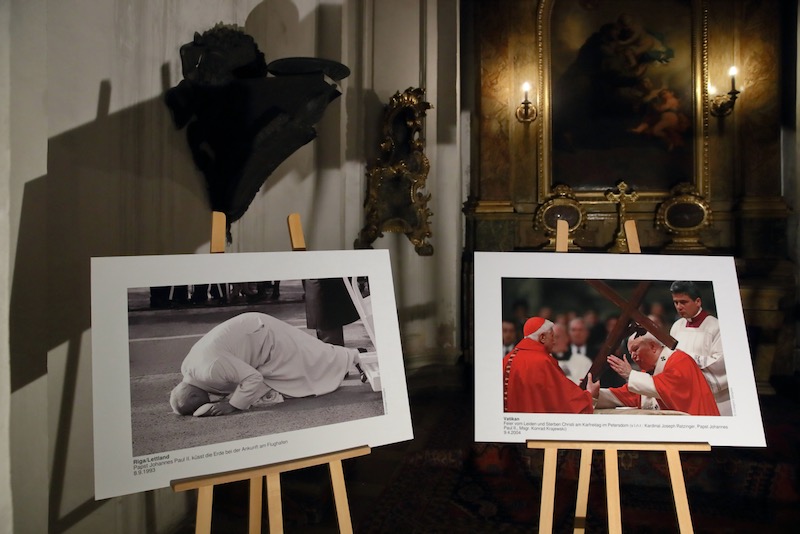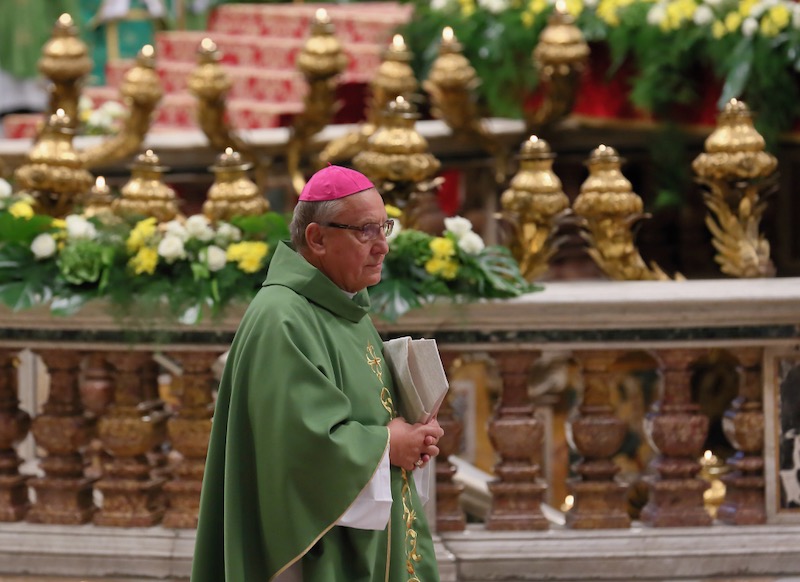An Italian priest has been freed, in good health, two years after being kidnapped by a jihadist group. The office of Mali’s president announced the liberation of Fr Pierluigi Maccalli, a member of the Society of African Missions, on 8 October. He was one of four hostages released by fighters believed to be linked to al-Qaeda. The 59-year-old priest was taken in September 2018 from an isolated parish in Niger, and was freed in northern Mali. The case illustrates the cross-border action of Islamist groups that are active in the Sahel area.
Two priests will go on trial for sexual abuse of students at a junior seminary which is located inside the Vatican. Fr Gabriele Martinelli and Fr Enrico Radice are to be tried in a Vatican City State court with the first hearings due to start on Thursday 15 October. Fr Martinelli is charged with sexually abusing younger boys while he was a seminarian at the St Pius X minor seminary, while Fr Radice, a former rector of the seminary is accused of aiding and abetting the abuse. The seminary is run by the Diocese of Como, in Italy, with boys who live there serving Mass in St Peter’s Basilica and attending a Catholic school in Rome.
According to the Vatican’s top diplomat Archbishop Paul Gallagher, who recently returned from a four-day mission in Belarus, the exiled Archbishop of Minsk, 74-year-old Archbishop Tadeusz Kondrusiewicz, who is living in Poland after being turned away at the border with Belarus, is unlikely to be allowed to return home. Archbishop Kondrusiewicz criticised the government’s handling of pro-democracy protests that followed disputed August elections. “We tried to argue that it was in the interests of everybody that he be allowed to return to the country,” said Archbishop Gallagher. “They do not share that opinion, and I’m not overly optimistic that they’re going to move on that one.”
The president of Poland’s Bishops’ Conference has said the Vatican rejected his request to have St John Paul II declared a Doctor of the Church and patron saint of Europe, while most bishops worldwide also ignored the proposal. Archbishop Stanislaw Gadecki of Poznan explained: “Although the first stage of our initiative has been completed, and the appropriate seeds sown in the ground, it seems we'll now need a lot of patience.”
Catholic bishops in Switzerland have protested the cutting of religious broadcasts by their country's state radio, in a joint petition with other faith leaders. The petition, signed by the Bishops Alain de Remy and Felix Gmur, as well as Protestant, Jewish and Muslim leaders, was circulated after the director of Swiss Radio and Television, Nathalie Wappler, announced the cancellation of three long-established religious radio slots from 2021, in a bid to save 46.4 million euros.
Lebanon’s Maronite bishops have expressed their “outrage” at the “political manoeuvres” that are delaying the formation of a new government capable of saving the disintegrating country. After their monthly meeting, held at the patriarchal see in Bkerké, they called for a government “of salvation, made up of reform-minded specialists capable of regaining the trust of the people and the international community”.
The Dutch bishops’ conference has urged parishes to cut back attendance at Mass to a maximum of 30 worshippers as soon as possible because of a recent jump in coronavirus infections. All Mass-goers must wear face masks and not sing. After a tight lockdown this spring, the Dutch government slowly allowed churches and mosques to admit worshippers with proper social distancing. But the relatively low number of infections during the summer led several houses of worship to drop their guard.
The historic Armenian Cathedral of the city of Shushi, in Nagorno-Karabakh, dedicated to Christ the Saviour, was hit by missiles on 8 October. The Armenian authorities blamed the Azeri army, in the context of the latest military escalation between Armenia and Azerbaijan over the Armenian enclave in Azerbaijan. Last week, Armenian Patriarch Karekin II said, “Azerbaijan has reaffirmed its insidious plan to evict Armenians from Artsakh (Nagorno Karabakh), and destroy the Armenian cultural presence, with the support of genocidal Turkey.”
South Korea's government has adopted a draft law to legalise abortion until the 14th week of pregnancy, but the country’s Catholic bishops oppose it. The public have been given 40 days to submit their views before it is sent to the National Assembly for approval. The bill plans to ban abortion after 14 weeks of pregnancy except in the case of a sex crime or if it affects the mother's health or the baby has severe congenital disabilities. Opinion polls suggest around three-quarters of South Koreans back the move to legalise abortion.
The Kurdish Regional Governorate, located in Iraq’s autonomous region, is creating a commission to examine the illegal expropriation of Christian properties, particularly in the Dohuk Governorate.
Mexico’s president Andrés Manuel López Obrador published an open letter to Pope Francis last weekend calling on the Catholic Church to apologise for abuses of Indigenous peoples during the conquest of Mexico in the 1500s. The letter comes as Mexico marks the 500th anniversary of the 1519-1521 conquest, which resulted in the deaths of a large part of the country’s pre-Hispanic population.
Kenya's President Uhuru Kenyatta joined national prayers in Nairobi marking the Huduma Day national holiday, in which Catholic bishops and others prayed for an end of the Covid-19 pandemic.
Chile will hold a plebiscite on 25 October to determine whether a new constitution will be drafted. A new constitution was one of the main demands of the popular movement that began a year ago with a fare hike on Santiago’s subway system but grew to encompass cost of living increases and economic inequality. The Permanent Committee of the Episcopal Conference of Chile called for Chileans to seek unity and politicians to attend to the people’s needs.
Peruvian President Martin Vizcarra said on 6 October that he is in discussion with the clergy to begin reopening churches in November, after seven months closed. Churches at first will not hold religious services and gradually return to normal operations. Peru has the highest death rate per capita from Covid-19 in Latin America, with more than 33,000 deaths.
Last Saturday Pope Francis telephoned Fr Julio Lancellotti, São Paulo's episcopal vicar for street people, to express his solidarity. Fr Lancellotti said that the Pope was aware of the difficulties he faced and said that we shouldn't lose heart but do what Jesus did, and stand alongside the poorest.



 Loading ...
Loading ...